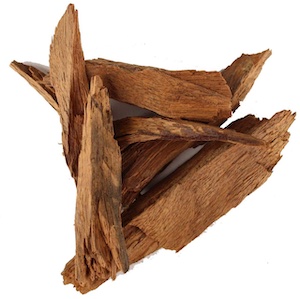Vijaysar (Pterocarpus marsupium), native to India, is an ecologically significant deciduous tree renowned for its medicinal properties. Its structure comprises a tall, straight trunk with rough, dark brown bark. The plant bears compound leaves featuring 5-7 leaflets, and the flowering season brings clusters of yellowish flowers. The tree produces flattened, winged fruits and hardwood known for durability. Intriguingly, the heartwood possesses a rich, dark red hue and a peculiar trait – when soaked in water, it releases a red color, which is a natural source of potent bioactive compounds, contributing to its traditional medicinal use.
Vijaysar (Pterocarpus marsupium) offers a myriad of health benefits. It is primarily recognized for its potent anti-diabetic properties, helping to regulate blood sugar levels. It also supports heart health, aiding in the reduction of cholesterol and triglycerides. Its antioxidant properties combat oxidative stress, promoting overall well-being. The tree’s bark is known to have anti-inflammatory properties, providing relief from various inflammatory conditions. Additionally, it contributes to digestive health, reducing symptoms like diarrhea and constipation. Vijaysar’s potential anti-cancer properties are being explored too. Its traditional use in Ayurvedic medicine underscores its therapeutic potential, making it a valuable resource in natural healthcare.
Vjiaysar for Diabetes
Vijaysar, scientifically known as Pterocarpus marsupium, holds promising potential in the management of diabetes due to its unique biochemical composition. The benefits of this medicinal plant primarily stem from its high content of flavonoids and phenolic compounds, which are recognized for their potent anti-diabetic effects.
The bark of Pterocarpus marsupium has been used traditionally in Ayurvedic medicine for managing blood sugar levels. Epicatechin, one of the key bioactive compounds found in the plant, is known to regenerate beta cells in the pancreas, thereby improving insulin secretion. Moreover, it also impedes glucose absorption in the gastrointestinal tract, reducing postprandial blood glucose levels. The plant also exhibits anti-inflammatory and antioxidant properties, which can help mitigate complications associated with diabetes, such as oxidative stress and chronic inflammation.
Additionally, the usage of this plant in a controlled manner under professional supervision can potentially lead to lower reliance on synthetic antidiabetic drugs, thus reducing the risks associated with their long-term use. However, it’s essential to remember that more extensive and rigorous clinical trials are required to fully understand the therapeutic potential of this plant in diabetes management.
When this herb is used along with other herbs like Jamun Fruit, haritaki, amla, gudmar and fenugreek seeds, it effectively helps in the management of blood sugar levels. Moolika Ayurveda Diasol Capsules contain all these herbs and it is the best ayurvedic medicine for diabetes.
Vijaysar for Weight Loss
Vijaysar, a medicinal plant known for its potent anti-diabetic properties, also presents remarkable potential in promoting weight loss. The plant’s bark is packed with bioactive compounds like flavonoids, tannins, and saponins, which have been associated with lipid metabolism modulation. A 2017 study reported that these compounds can inhibit pancreatic lipase, an enzyme critical in fat digestion and absorption. This inhibition could decrease overall fat absorption, leading to lower calorie intake and ultimately weight loss.
Additionally, this plant is known to improve insulin sensitivity, reducing insulin resistance, a common problem in overweight individuals. By enhancing insulin functionality, it ensures that glucose is used efficiently, thereby avoiding its conversion into stored fat. Moreover, it has been suggested that it can help reduce cravings for unhealthy foods, thus assisting in maintaining a balanced diet.
While further research is necessary to fully understand its weight loss properties, preliminary studies indicate significant potential. Therefore, incorporating this plant into one’s diet, under the guidance of a healthcare provider, could be an effective natural strategy in a comprehensive weight loss program.
Improves Digestive Health
Among the many health benefits of Vijaysar, it has a significant impact on digestive health, contributing to improved overall wellness. This versatile herb aids digestion by stimulating the secretion of digestive enzymes, thus efficiently breaking down food and increasing nutrient absorption.
It is particularly beneficial in managing disorders such as indigestion, diarrhea, and constipation, owing to its natural laxative properties. In addition, it is believed to soothe the intestinal lining, helping to alleviate issues like stomach ulcers and gastritis. Notably, this herb’s anti-inflammatory characteristics help reduce inflammation within the digestive tract, promoting a healthier gut environment.
In individuals with metabolic conditions like diabetes, its role is two-pronged: it not only improves digestive efficiency but also aids in the regulation of blood sugar levels, largely thanks to its hypoglycemic effects. Thus, this robust herb fosters a healthier digestive system, paving the way for improved general health.
Ayurveda Medicinal Properties of Vijaysar
Vijaysar, known in the botanical world as Pterocarpus marsupium, is an esteemed plant in Ayurveda due to its various medicinal properties. Its Sanskrit synonyms include Asan, Bijaka, Pitashalaka, Sphaatika, Prapurna, and Yajnika. It is considered to balance all the three doshas – Vata, Pitta, and Kapha – with its primary action on Pitta dosha.
The rasa, or taste, of Vijaysar is described as tikta (bitter) and kashaya (astringent). The guna, or qualities, of Vijaysar are laghu (light) and ruksha (dry), which lend to its ability to balance the Kapha and Pitta doshas. The veerya, or potency, is considered ushna (hot), which implies its capability to provide heat and energy to the body. The vipaka, or post-digestive effect, is katuka (pungent) that adds to its digestive and metabolic stimulatory effects.
Vijaysar exhibits a wide array of health benefits. It is widely recognized for its anti-diabetic property and is often prescribed in Ayurveda for managing diabetes. It helps in reducing blood glucose levels by stimulating insulin production and improving the cellular uptake of glucose. It also has strong anti-inflammatory, anti-oxidant, and lipid-lowering properties that make it effective in preventing and managing heart diseases.
Furthermore, its astringent properties aid in treating diarrhea and dysentery, while its anti-inflammatory properties are beneficial for conditions such as arthritis. It’s also used as a blood purifier and for skin conditions, exhibiting wound healing properties.
Vijaysar’s bark, heartwood, leaves, and flowers are all used in different ayurvedic preparations. It is important to note that while Vijaysar has many benefits, one should consult with an Ayurvedic practitioner before starting any new herbal treatments as individual needs and responses can vary. The Ayurvedic principles of rasa, guna, veerya, and vipaka help determine how herbs like Vijaysar will affect individuals and their doshas.
Reference:
Patel, D. K., Prasad, S. K., Kumar, R., & Hemalatha, S. (2012). An overview on antidiabetic medicinal plants having insulin mimetic property. Asian Pacific Journal of Tropical Biomedicine, 2(4), 320-330.
Bhat, et al. “Evaluation of Pterocarpus marsupium for anti-hyperlipidemic effects: A chronic study on diet-induced hyperlipidemia,” Journal of Ethnopharmacology, 2017
Jain, S., & Patel, N. (2012). Phytochemical and Pharmacological Profile of Pterocarpus marsupium Roxb. – An Overview. International Journal of Pharmaceutical Sciences and Drug Research, 4(1), 01-05.


